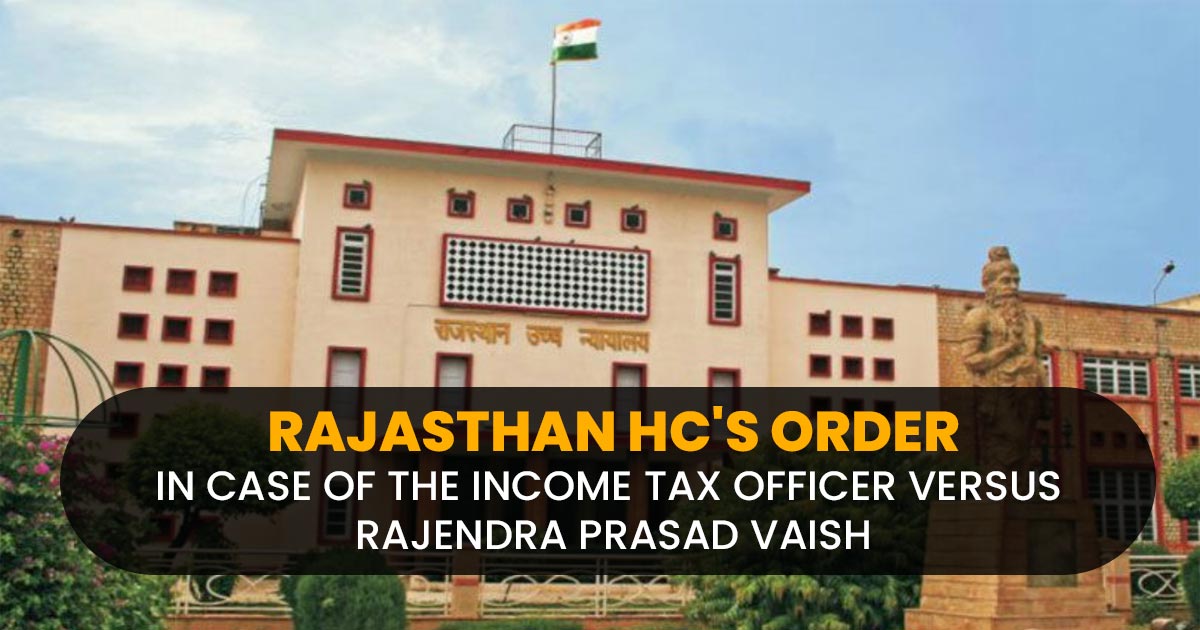
While finding a taxpayer guilty of the offence of filing delayed income tax returns, “mens rea“ is a crucial ingredient, the Rajasthan High Court ruled.
In the absence of mens rea, an accused could not be held guilty, and his conviction u/s 276 CC of the Income Tax Act cannot be supported, the bench of Justice Anoop Kumar Dhand noted.
After obtaining sanction from the Commissioner of Income Tax the Income Tax Officer provides a criminal complaint against the respondent-taxpayer u/s 276 CC of the Income Tax Act. It was alleged that the taxpayer did not provide his ITR u/s 139(1) in the specified time on or before 31.07.1978, and the taxpayer furnished his returns dated December 31, 1980.
U/s 271(1) of the Income Tax Act of 1961 the proceedings were started through the notice on 31st December 1981, however, the respondent losses to elaborate anything. A reminder was provided, however, no response was furnished. Hence the penalty of Rs 2200 is been levied by the income tax officer on the respondent u/s 271(1).
Under Section 276 CC the charges were applied against the respondent. While the charges are been refused by the accused and claimed for a trial. The taxpayer refuses the allegations however no defence proof was produced. The taxpayer was forgiven.
The contention of the department is that the allegation against the taxpayer was that a late ITR related to the AY 1978-79 was provided via him post a lapse of exceeding than 28 months. It is stated on the record via the method of leading proof that the income tax department provides. There was no cause or occasion available with the trial court to forgive the charges of the respondent.
The taxpayer argued that a certain delay in ITR filing was there however there was no intent to delay, which draws the principle of ‘mens rea’. A strict and reasoned judgment has been passed in favour of the respondent, after appreciating the proof available on the record, granting him the benefit of the doubt.
In its wisdom, the Tax Law Amendment and Miscellaneous Provisions Act, 1986, added Section 278E to the Act with effect from September 10, 1986. It delivers that in any prosecution for the offence under the same Act that needs a “culpable mental state” on the part of the accused, the Court will assume the presence of such a mental state. The load is transferred to the accused to prove that he had no such mental state.
According to the explanation, the culpable state shall consist of “intention,” “motive,” and “knowledge.” It furnishes that the absence of these culpable mental states will need to be proved by the accused in defence beyond a valid doubt.
The court observed that the complainant, to bring home the guilt of the accused towards the offence punishable u/s 276C is required to prove the mens rea of the accused for not filing the tax or attempting to evade the tax. In the current matter, the accused respondent elaborated in detail the causes for the late filing of the ITRs and further depositing the whole tax amount including a penalty.
As per the court, the petitioner loses to prove that the respondent had mens rea to evade the tax payment. The income tax department loses to provide evidence of the guilt of the accused respondent beyond all reasonable doubt.
| Case Title | The Income Tax Officer Vs. Rajendra Prasad Vaish, S/o Shri Banshidhar Vaish |
| S.B. Criminal Appeal No | 543/1991 |
| Date | 02.04.2024 |
| For Appellant(s) | Mr. Siddharth Bapna, Adv. |
| For Respondent(s) | Mr. Shiv Pratap Singh Rathore, Adv. |
| Rajasthan High Court | Read Order |